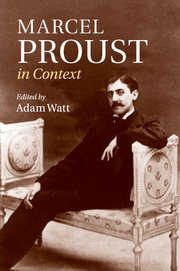Book contents
- Frontmatter
- Contents
- List of Illustrations
- Notes on contributors
- Figure I. Marcel Proust, portrait in oils by Jacques-Émile Blanche, 1892
- Preface
- Figure 2. Proust photographed on his death-bed by Man Ray, 1922
- Note on the text
- Chronology
- Part I Life and works
- Part II Historical and cultural contexts
- Part III Critical reception
- Further reading
- Index
- References
Preface
Published online by Cambridge University Press: 05 November 2013
- Frontmatter
- Contents
- List of Illustrations
- Notes on contributors
- Figure I. Marcel Proust, portrait in oils by Jacques-Émile Blanche, 1892
- Preface
- Figure 2. Proust photographed on his death-bed by Man Ray, 1922
- Note on the text
- Chronology
- Part I Life and works
- Part II Historical and cultural contexts
- Part III Critical reception
- Further reading
- Index
- References
Summary
Preface
What unique place might we allot to his work? Between philosophy, science, epic poetry, satire, memoirs and all hitherto recorded forms of the novel?
Readers of Proust are still asking these questions today, posed by the society painter Jacques-Émile Blanche in a memoir that appeared in 1928, the year after the publication of À la recherche du temps perdu was completed. Proust was dead only six years but the myth of the man was already alive and strong. It had been growing, in fact, since the time of Blanche's portrait of the author, in oils, in 1892, some thirty years before (see Fig. 1). The plurality of Proust's writing – prose that shifts effortlessly from cool logic to impassioned bluster, from the observational noting of the laboratory to spinning the fine and delicate thread of metaphor – invites multiple modes of interpretation, multiple frames of reference through which we might read. Such writing is singular, provocative, demanding. The chapters that follow offer a succession of approaches to individual aspects of this plurality; they provide spaces in which we might think about Proust, his work and the conditions of its creation: in its own way each chapter contributes an answer, or part of an answer to Blanche's question.
- Type
- Chapter
- Information
- Marcel Proust in Context , pp. xvii - xixPublisher: Cambridge University PressPrint publication year: 2013



